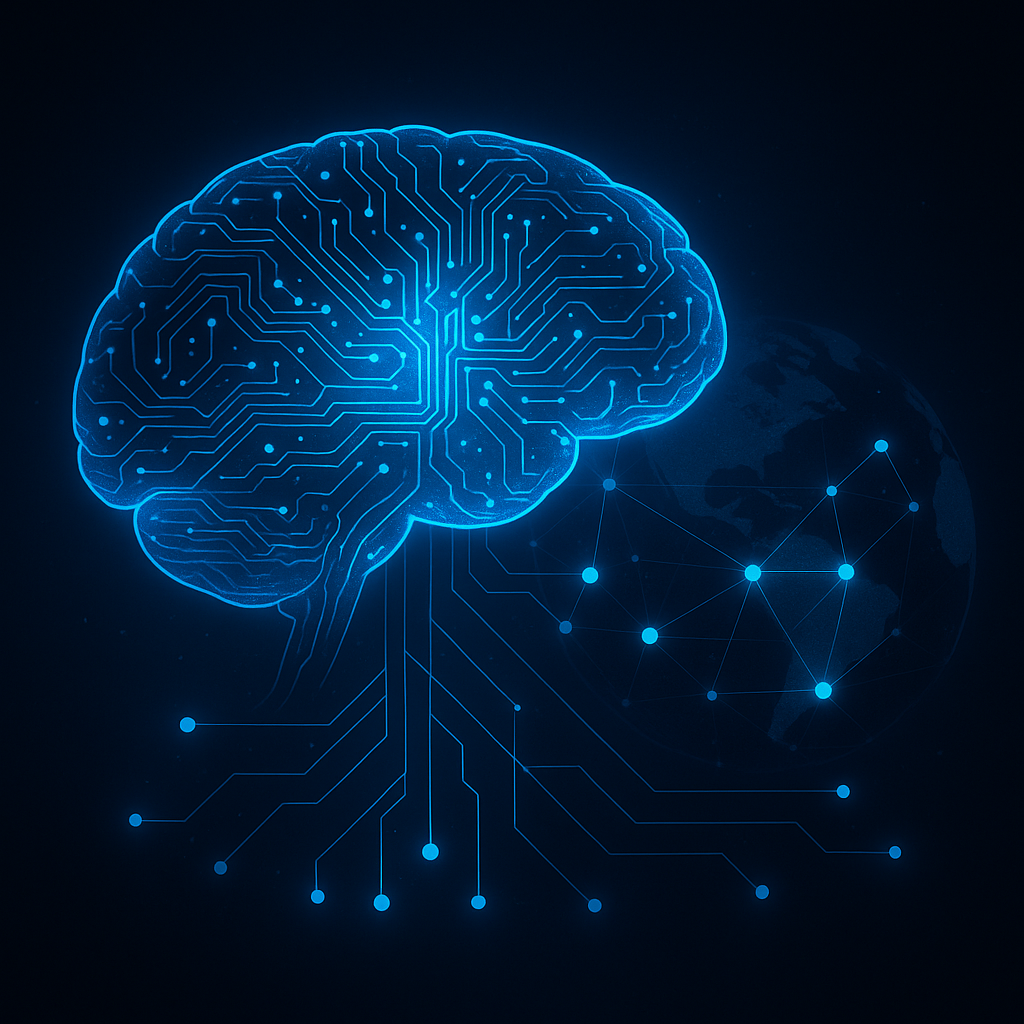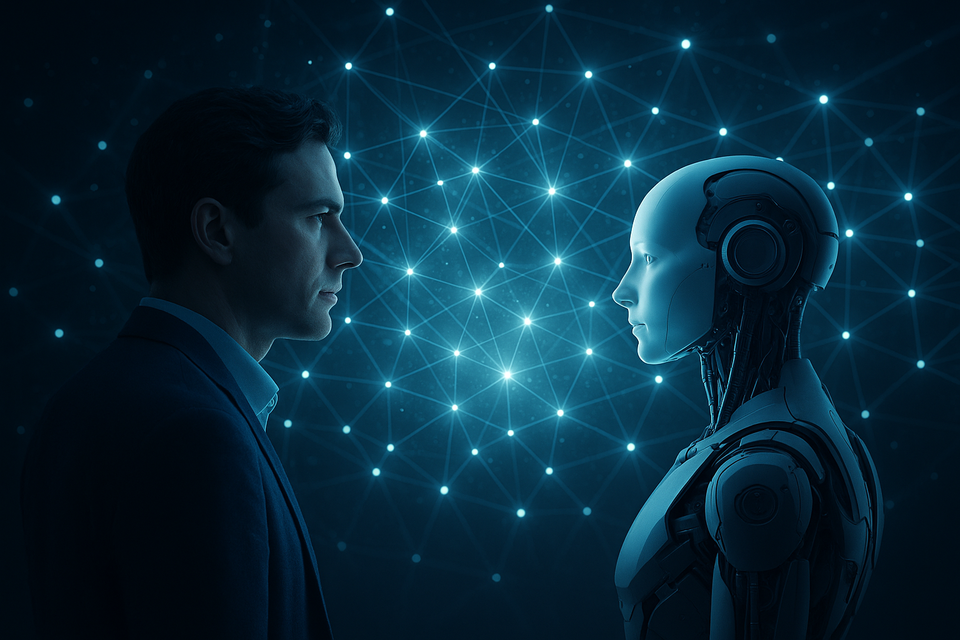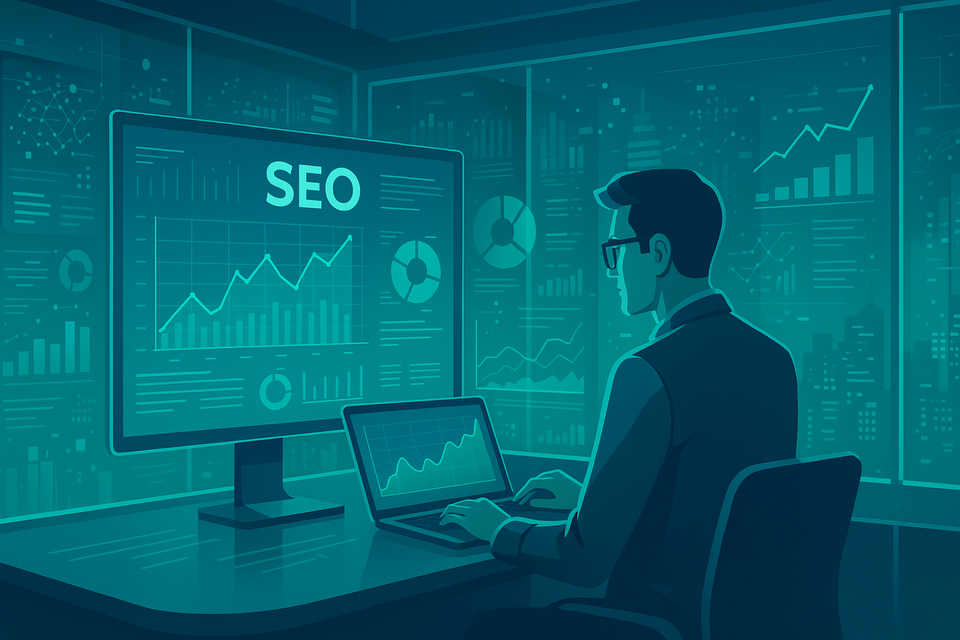AI & SEO in 2025: How Artificial Intelligence Is Redefining Search Optimization
AI isn’t replacing SEO — it’s rewriting the rules. Discover how artificial intelligence is reshaping search engines, content creation, and optimization strategies in 2025.

Search Engine Optimization (SEO) has always evolved with technology — from keyword stuffing to semantic search, and now to AI-driven algorithms that learn, adapt, and personalize every result.
But in 2025, the relationship between AI and SEO has reached a turning point.
AI isn’t just helping search engines understand content — it’s now helping creators write, optimize, and distribute it.
This article dives deep into how artificial intelligence is transforming SEO strategy, what’s changing under the hood of search algorithms, and how businesses and creators can leverage AI to grow visibility organically.
🌐 1. The Evolution of SEO — From Keywords to Intelligence
In the early 2000s, SEO was simple:
you added your target keyword a dozen times, built some backlinks, and watched your site climb to the top.
Then came Google’s semantic revolution — with updates like Hummingbird, RankBrain, and BERT — teaching search engines to understand context and intent rather than just words.
Today, with AI models like Gemini, GPT-5, and Claude, search optimization has entered a new era:
it’s no longer about what you say — but how deeply your content answers real human questions.
⚙️ 2. How AI Powers Modern Search Engines
AI has become the invisible core of every major search engine.
Here’s how it shapes the SEO landscape today:
- Natural Language Understanding (NLU): AI models interpret human queries in full context. A search for “how to deploy a Linux server securely” now prioritizes detailed, structured tutorials — not just keyword matches.
- Personalized Results: AI learns user behavior — clicks, reading time, and search patterns — to deliver results tailored to each person.
- Content Classification: Modern AI can categorize content by tone, accuracy, and intent (educational, commercial, or navigational).
- AI-Powered Crawling: Search engines use machine learning to predict which pages are worth reindexing first — improving speed and relevance.
In short, AI makes search engines smarter — but also more selective.
🧠 3. How AI Is Transforming SEO for Content Creators
For creators, writers, and brands, AI has become an ally, not a threat — if used strategically.
🔍 AI Tools That Enhance SEO Workflows
- Keyword clustering: AI groups semantically related keywords to help plan topic clusters.
- Search intent mapping: Tools like SurferSEO, Clearscope, and NeuronWriter use AI to identify what searchers really want.
- Content gap analysis: AI scans top-ranking pages and suggests what your article is missing.
- AI copy refinement: Models like GPT-5 and Jasper improve tone, readability, and structure while preserving your voice.
Instead of replacing writers, AI helps them think at scale — making every piece of content more targeted, structured, and discoverable.
📊 4. The Rise of AI-Generated Content — and Google’s Response
AI-generated text exploded in 2024 and 2025.
Entire websites are now built on machine-written blogs. But does Google penalize this content?
The short answer: No — as long as it’s valuable.
Google’s official guidance (March 2025 update) clarified:
“We reward content that demonstrates experience, expertise, authoritativeness, and trust — regardless of how it’s produced.”
That means AI-assisted content can rank just as well as human-written text,
if it delivers real value and accuracy.
So, what matters most now:
- Is the content factual and original?
- Does it serve the user’s intent?
- Is there transparency about its creation?
💬 5. Human + AI = the New SEO Workflow
The best SEO in 2025 doesn’t come from AI alone.
It comes from human creativity powered by AI precision.
Here’s how modern creators structure their process:
1️⃣ Human Ideation: Humans still understand emotion, storytelling, and cultural nuance better than machines.
2️⃣ AI Analysis: AI identifies keyword clusters, headings, and search intent patterns.
3️⃣ Human Writing: The draft is written with personal experience and voice.
4️⃣ AI Optimization: Tools suggest better meta descriptions, schema markup, and readability improvements.
5️⃣ Human Review: Fact-checking, context, and emotional tone are finalized manually.
The result?
Content that’s both algorithmically optimized and emotionally engaging.
🧩 6. Top AI SEO Tools You Should Know in 2025
| Tool | Focus | Why It’s Useful |
|---|---|---|
| SurferSEO | On-page optimization | AI-driven keyword clustering and NLP scoring |
| NeuronWriter | Topic intent | Perfect for structured long-form blogs |
| ChatGPT / GPT-5 | Content creation | Natural language generation, rewriting, ideation |
| Jasper AI | Marketing SEO | Tone-matched copywriting |
| RankIQ | Niche targeting | Ideal for bloggers with limited resources |
| Semrush AI Writing Assistant | SEO + analytics | Integrates AI scoring directly into keyword data |
| MarketMuse | Authority building | Identifies topic gaps and internal link opportunities |
These tools don’t replace SEO professionals — they extend their capability.
🔐 7. Ethics, Transparency, and the “AI Watermark” Future
As AI content floods the web, transparency becomes crucial.
Several major engines are now exploring AI watermarking — invisible metadata that identifies machine-generated text.
For SEO creators, this means:
- Always disclose AI assistance (even subtly in metadata or author bios).
- Combine AI output with human insights and original research.
- Prioritize E-E-A-T (Experience, Expertise, Authoritativeness, Trustworthiness) — Google’s core evaluation principle.
AI isn’t about speed anymore — it’s about responsible scale.
🧭 8. How AI Changes Keyword Strategy
Traditional keyword SEO focused on single phrases.
AI SEO focuses on semantic relationships — networks of meaning.
Example:
Instead of targeting “Linux server setup,”
an AI-optimized content map includes:
- How to configure firewalls
- SSH key management
- Common deployment errors
- Secure DNS setup
This topical clustering increases authority — Google and Bing now recognize when a site owns an entire niche.
⚡ 9. Predictive SEO — Where AI Is Headed Next
AI doesn’t just analyze search behavior — it’s starting to predict it.
By analyzing millions of queries and content trends,
AI can forecast emerging keywords before they spike.
In the next 12 months, expect SEO dashboards that:
- Suggest what to write next month based on rising queries
- Track AI search features like ChatGPT-integrated engines (Perplexity, Gemini Search)
- Adapt your content dynamically to algorithm shifts
SEO is moving from reactive to anticipatory — and AI is the engine behind that.
🌍 10. Beyond Google — The Rise of AI Search Ecosystems
2025 is seeing a rise in AI-native search engines like:
- Perplexity AI — conversational discovery
- You.com — personalized AI search
- OpenAI Search — integrated with GPT answers
These platforms reward structured, factual, and verified content, not just backlinks.
Optimizing for them means embracing structured data, verified citations, and consistent metadata.
AI-driven search will soon value truth over tricks — and that’s a win for authentic creators.
🧩 11. How to Future-Proof Your SEO Strategy
✅ Stop chasing algorithm updates.
Instead, understand what AI values: clarity, originality, and verified knowledge.
✅ Build topic authority, not keyword density.
Cover your niche deeply and consistently.
✅ Use AI as a strategic partner — not a writing robot.
It’s there to amplify your insight, not replace it.
✅ Collect your own data.
First-party analytics and internal metrics will be more reliable than external estimates as AI personalization increases.
💬 Final Thoughts
AI isn’t killing SEO — it’s evolving it.
We’re entering an era where search engines think more like humans — and that means the best SEO will come from those who combine data with empathy.
If you write clearly, answer real questions, and use AI to refine (not replace) your creativity,
you’ll not only survive — you’ll lead.
The future of SEO is not about gaming algorithms.
It’s about collaborating with them. 🤖
🔗 Learn More
If you want to explore AI-powered content creation, optimization, and automation workflows for your tech brand:
👉 dargslan.com
#AISEO #SearchOptimization #ContentMarketing #MachineLearning #DigitalStrategy #GhostCMS


